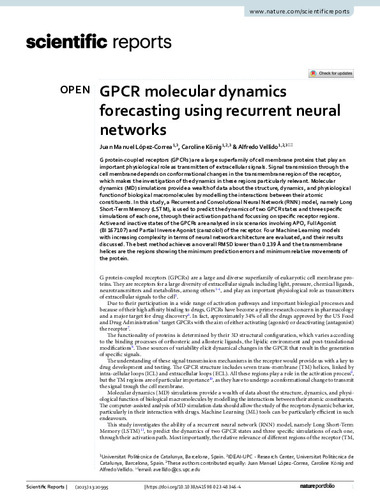Doctorat en Intel·ligència Artificial
Col·leccions
-
Articles de revista [41]
Enviaments recents
-
Padding Aware Neurons

(Institute of Electrical and Electronics Engineers (IEEE), 2023)
(Institute of Electrical and Electronics Engineers (IEEE), 2023)
Text en actes de congrés
Accés obertConvolutional layers are a fundamental component of most image-related models. These layers often implement by default a static padding policy (e.g. zero padding), to control the scale of the internal representations, and ... -
Analyzing text representations by measuring task alignment

(Association for Computational Linguistics, 2023)
(Association for Computational Linguistics, 2023)
Text en actes de congrés
Accés obertTextual representations based on pre-trained language models are key, especially in few-shot learning scenarios. What makes a representation good for text classification? Is it due to the geometric properties of the space ... -
Anomaly detection in gas turbines using outlet energy analysis with cluster-based matrix profile

(2024-01-30)
(2024-01-30)
Article
Accés obertGas turbines play a key role in generating power. It is really important that they work efficiently, safely, and reliably. However, their performance can be adversely affected by factors such as component wear, vibrations, ... -
AI lifecycle zero-touch orchestration within the edge-to-cloud continuum for industry 5.0

(Multidisciplinary Digital Publishing Institute (MDPI), 2024-02-02)
(Multidisciplinary Digital Publishing Institute (MDPI), 2024-02-02)
Article
Accés obertThe advancements in human-centered artificial intelligence (HCAI) systems for Industry 5.0 is a new phase of industrialization that places the worker at the center of the production process and uses new technologies to ... -
Applying generative models and transfer learning to physiological data classification

(IOS Press, 2023-11-01)
(IOS Press, 2023-11-01)
Text en actes de congrés
Accés obertThe scarcity and imbalance of datasets for training deep learning models in a specific task is a common problem. This is especially true in the physiological domain where many applications use complex data collection ... -
Explaining the behaviour of reinforcement learning agents in a multi-agent cooperative environment using policy graphs

(2024-01-31)
(2024-01-31)
Article
Accés obertThe adoption of algorithms based on Artificial Intelligence (AI) has been rapidly increasing during the last few years. However, some aspects of AI techniques are under heavy scrutiny. For instance, in many use cases, it ... -
Advances in the use of deep learning for the analysis of magnetic resonance image in neuro-oncology

(Multidisciplinary Digital Publishing Institute (MDPI), 2024-01-10)
(Multidisciplinary Digital Publishing Institute (MDPI), 2024-01-10)
Article
Accés obertMachine Learning is entering a phase of maturity, but its medical applications still lag behind in terms of practical use. The field of oncological radiology (and neuro-oncology in particular) is at the forefront of these ... -
Brealing through the traffic congestion: asynchronous time series data integration and XGBoost for accurate traffic density prediction

(Institute of Electrical and Electronics Engineers (IEEE), 2023)
(Institute of Electrical and Electronics Engineers (IEEE), 2023)
Text en actes de congrés
Accés obert -
Ad-RuLer: A novel rule-driven data synthesis technique for imbalanced classification

(Multidisciplinary Digital Publishing Institute, 2023-11-23)
(Multidisciplinary Digital Publishing Institute, 2023-11-23)
Article
Accés obertWhen classifiers face imbalanced class distributions, they often misclassify minority class samples, consequently diminishing the predictive performance of machine learning models. Existing oversampling techniques predominantly ... -
GPCR molecular dynamics forecasting using recurrent neural networks

(Springer Nature, 2023)
(Springer Nature, 2023)
Article
Accés obertG protein-coupled receptors (GPCRs) are a large superfamily of cell membrane proteins that play an important physiological role as transmitters of extracellular signals. Signal transmission through the cell membrane depends ... -
Assessing biases through visual contexts

(2023-07)
(2023-07)
Article
Accés obertBias detection in the computer vision field is a necessary task, to achieve fair models. These biases are usually due to undesirable correlations present in the data and learned by the model. Although explainability can ... -
Measuring the mixing of contextual information in the transformer

(Association for Computational Linguistics, 2022)
(Association for Computational Linguistics, 2022)
Comunicació de congrés
Accés obertThe Transformer architecture aggregates input information through the self-attention mechanism, but there is no clear understanding of how this information is mixed across the entire model. Additionally, recent works have ...













